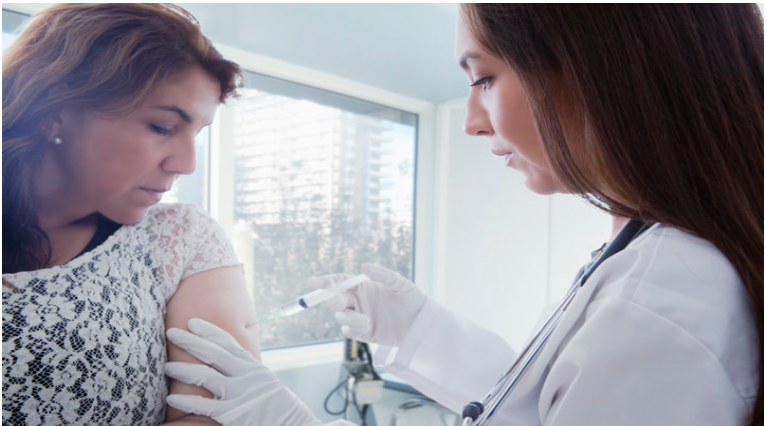WELLNESS--Doctors stress that you need to stay on top of immunizations for your health ― even as an adult.
We may not like hearing it, but it’s true: Adults aren’t off the hook when it comes to vaccines.
Even if you’ve had all your childhood vaccinations, there are plenty of reasons to get vaccinated when you’re older. Some vaccines wear off, new vaccines are available, you may be at higher risk for certain illnesses that shots can protect you from, and vaccinations help protect the people around you.
“What makes vaccines unique is that they protect the person who is vaccinated as well as the community in which they live,” said Bruce Gellin, president of global immunization at Sabin Vaccine Institute, a nonprofit organization in Washington, D.C., that promotes vaccine development.
“This is as true for adults as it is for infants and children, and we’re encouraged that the research community is developing vaccines that will prevent serious infectious diseases like pneumonia across the lifespan,” Gellin continued.
Here are six vaccines you should consider getting as an adult to protect your health:
HPV Vaccine (Gardasil 9)
The HPV vaccine reduces the risk of contracting the human papillomavirus and subsequently lowers an individual’s chances of having cervical cancer or genital warts, said Nathan Samras, an assistant professor at the David Geffen School of Medicine at the University of California, Los Angeles, and a primary care physician at UCLA Health Beverly Hills Primary Care.
Previously, the vaccine was recommended for males and females up to the age of 26, but the FDA recently expanded the recommendation to include men and women up to age 45.
“The HPV vaccine is one of the great success stories in reducing cancer,” Samras said. “Cervical cancer was one of the common causes of cancer in women, and those rates have plummeted with health interventions, including regular pap smears and other screenings, but also the HPV vaccine because this virus is one of the causes of cervical cancer.”
“The HPV vaccine is one of the great success stories in reducing cancer.”
- Nathan Samras, primary care physician at UCLA Health Beverly Hills Primary Care
Tdap Vaccine
The Tdap vaccine protects against tetanus, diphtheria and pertussis (which you probably know as whooping cough). According to the U.S. Centers for Disease Control and Prevention, all adults should get this vaccine if they didn’t receive it in adolescence, and then follow it with a Td booster shot every 10 years to continue protection against tetanus and diphtheria.
Tdap is also very important for pregnant women when they’re somewhere between 27 and 36 weeks pregnant to help protect their babies, the CDC says. Whooping cough can be serious and deadly for babies, but they can’t be immunized for it until they are six to eight weeks old. By vaccinating a mother, she can pass antibodies on to her unborn baby that help protect the newborn in its first months of life. “It helps create a bubble around the baby to reduce the risk of that exposure,” Samras said.
Shingles Vaccine (Shingrix)
Shingles, also known as herpes zoster, is a painful illness that presents as a blistering rash that’s usually localized to one side of the body or face. The illness is more common as people get older and sometimes leads to a complication called postherpetic neuralgia, in which the pain can last for months or years.
For adults over 50, the CDC recommends protecting against shingles with a vaccination called Shingrix, which is more than 90 percent effective in preventing both shingles and postherpetic neuralgia. The vaccine is administered in two doses, separated by an interval of two to six months.
The CDC notes that Shingrix is the preferred shingles vaccine over Zostavax, which has been in use to prevent shingles since 2006. “Even if you’ve had Zostavax in the past, getting the two shots of Shingrex will decrease your risk of this painful disease significantly,” Samras said.
Pneumococcal Vaccine
Pneumococcal disease is a fairly common illness but can be severe, killing and hospitalizing thousands each year with serious infections like pneumonia and meningitis. Many of those who become the sickest are adults ages 65 and older.
“For adults, two different pneumonia vaccines are available ― PPSV23 and PCV13,” said Lisa Doggett, an Austin, Texas-based family physician. “Each protects recipients against different strains of pneumococcal bacterial infection.”
The CDC recommends pneumococcal vaccines for adults 65 and up, as well as in younger adults with certain medical conditions like diabetes and heart disease that put them at a higher risk of becoming seriously ill. “They cannot stop all forms of pneumonia, but they cut the risk significantly and save lives,” Doggett said.
Flu Vaccine
The CDC says getting a seasonal flu vaccine each year is the best way to protect yourself against influenza, which killed around 80,000 and hospitalized 900,000 during last year’s flu season. The influenza virus changes regularly, so it’s important to get a flu shot each year to have up-to-date immunization against the most common strains predicted for any given year.
Samras said this vaccination has one of the lower rates of immunization, partly because of a common misconception that the vaccine will cause the flu. “I empathize with the possibility of having those symptoms when the immune system is triggered, but I do reassure patients that they’re not getting the flu,” Samras said.
Your best bet is to get this vaccination by the end of October each year, according to the CDC, but later vaccinations can still be beneficial.
“I empathize with the possibility of having those symptoms when the immune system is triggered, but I do reassure patients that they’re not getting the flu.”
Travel Vaccines
“Adults traveling may benefit from typhoid, Japanese encephalitis, cholera and yellow fever vaccinations depending on the location of their travel,” said Amesh Adalja, a physician and senior scholar at the Johns Hopkins Center for Health Security.
To determine which vaccines you may need for upcoming travel, you can search your destination on the CDC’s travel destinations page, where you’ll find detailed information regarding the required and recommended immunizations for most countries.
Staying On Top Of What Immunizations You Need
If you’re looking for more information about the vaccines you may need in adulthood, check out this helpful chart from the CDC that breaks down vaccine schedules by age.
“Immunizations are one of the most important advances in public health of all time,” Doggett said. “Immunizations save lives, reduce hospitalizations and overall health care costs, and improve quality of life. With rare exceptions, they are safe and well-tolerated.”
(Beth Krietsch posts at HuffPost [[huffingtonpost.com]] … where this report originated.)
-cw

















